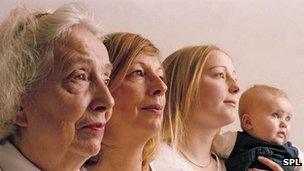Womb cancer deaths 'are rising'
- Published

Survival rates for women with womb cancer have improved
The number of women dying from cancer of the womb - known as uterine cancer - has increased by nearly 18% in the past decade, according to the charity Cancer Research UK.
Data showed, externalthat more cases are now being diagnosed. While women are living longer after a diagnosis, the total number of deaths has also increased.
It has been argued that rising levels of obesity were behind the rise.
Cancer Research UK said the finding was "hugely troubling".
Cancer of the womb is the fourth most common cancer in women and tends to occur after the menopause.
From the 1970s to 1996 the incidence of womb cancer stayed roughly the same at about 13.7 cases for every 100,000 women in the UK. It now stands at 19.6 per 100,000, a 43% increase.
Survival rates have improved with 77% of women now living at least five years after treatment. However, deaths have gone up.
In the past decade the mortality rate has gone from 3.1 to 3.7 deaths from uterine cancer for every 100,000 women. In 2010, 1,937 women died from the cancer.
Prof Jonathan Ledermann, a gynaecological cancer expert at the charity, said: "It's hugely troubling that more women are dying from womb cancer, but we shouldn't let this cloud the fact that the chances of surviving the disease are still better than ever.
"This is due to better organisation of care for women's cancers and more widespread use of one-stop clinics for post-menopausal bleeding, as well as advances in the use of surgery, chemotherapy and radiotherapy through clinical trials."
Rachael Gormley, from the World Cancer Research Fund, said: "Womb cancer is one of several types of cancer where there is strong evidence that obesity increases risk. Others include breast, bowel, oesophageal, pancreatic and kidney.
"As levels of obesity rise, we can expect the number of cancer cases to also increase.
"Taking steps to avoid becoming obese, such as eating a healthy diet and being active each day, is one of the most important things we can do to reduce our risk of cancer."
- Published29 September 2010